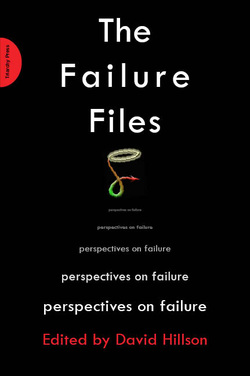|
Imprint: Triarchy Press
List Price: £25.00 Format: Paperback Extent: 168pp. Size: 15.2 x 22.9 cm ISBN: 978-1-908009-30-2 Tags: Risk management, Leadership, Innovation The Failure Files Perspectives on Failure Edited by David Hillson Book Page About the contributors Buy the paperback (£25)Buy the pdf (£22)Click the 'Buy' button below. At checkout, click No postage on ebooks from the dropdown.
After paying, we will send an immediate confirmation and email your ebook file within 24 hours. PDF ISBN 978-1-909470-68-2
version: bookmarked pdf (pdf text cannot be edited, printed or copied - email us if you need this capability.) |
The Failure Files:
|
Read more:
The Contributors
About the book Contents Related Titles: Inside Project Red Stripe The Innovation Acid Test Explore |

